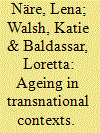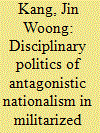| Srl | Item |
| 1 |
ID:
155070


|
|
|
|
|
| Summary/Abstract |
This Special Issue on ‘Ageing in Transnational Contexts: Transforming Everyday Practices and Identities in Later Life’ extends our understanding of how ageing is experienced in transnational contexts. It focuses on how everyday lives and identities in older age are being negotiated by individuals who have migration histories or who are affected by the mobilities of others in their lives. In the introduction, we situate our approach within an emerging strand of research investigating the inter-related processes of ageing and transnational migration. We also present the seven empirical case studies that constitute the issue and discuss their collective contribution for the research field.
|
|
|
|
|
|
|
|
|
|
|
|
|
|
|
|
| 2 |
ID:
115230


|
|
|
|
|
| Publication |
2012.
|
| Summary/Abstract |
After the Korean War (1950-53), the two militarized Koreas governed each and every member of society in similar ways through their disciplinary politics of antagonistic nationalism. The existing studies of state formation in the two Koreas have neglected an aspect of state power that was neither necessarily top-down nor violent from above but also reproduced from below. In both South and North Korea, especially from the 1960s to the 1970s, state power had internal dynamics that penetrated the day-to-day activities of most citizens and led them to actively accept and participate in nationalist rule. This article explores an understudied aspect of the two Koreas' state power that was disciplinarily diffused in people's everyday practices through reproduction of aggressive nationalism from below and the organic construction of the individual body and nation.
|
|
|
|
|
|
|
|
|
|
|
|
|
|
|
|
| 3 |
ID:
150451


|
|
|
|
|
| Summary/Abstract |
Electricity is becoming ever more central to the everyday practices of households. As the energy system decarbonises, it is likely that electricity will supply even more services, thereby increasing the dependence of communities on reliable electricity supply. In this situation, the risk of power outages during extreme weather events poses a serious challenge to the safety and wellbeing of communities. However, little is known of the capacity of households to manage normal day-to-day life in such circumstances. This paper focuses on the UK winter storms that occurred in February 2014, the result of which 80,000 homes were left without power and communities not reconnected for several days. We outline the impacts these power outages had on households, describing the challenges faced and the strategies adopted to alleviate impacts. This provides insight into everyday household-level resilience achieved through social and material elements that constitute everyday life.
|
|
|
|
|
|
|
|
|
|
|
|
|
|
|
|
| 4 |
ID:
159217


|
|
|
|
|
| Summary/Abstract |
Imaginations of existential threat do not only express themselves in exceptional actions – as prominently suggested by securitization theory – but also in routine, day-to-day practices. They can become a part of ‘normal’ life. We demonstrate this by following the everyday activities of individuals from the Lyuli as well as the lesbian, gay, bisexual and transgender (LGBT) community in Kyrgyzstan. Individuals from both groups actively and consciously secure themselves by employing a mix of practices that range from deterrence and open confrontation to avoidance, adaptation and hiding tactics. For the purpose of tracing and discussing these activities, our article develops and applies the innovative concept of securityscapes.
|
|
|
|
|
|
|
|
|
|
|
|
|
|
|
|